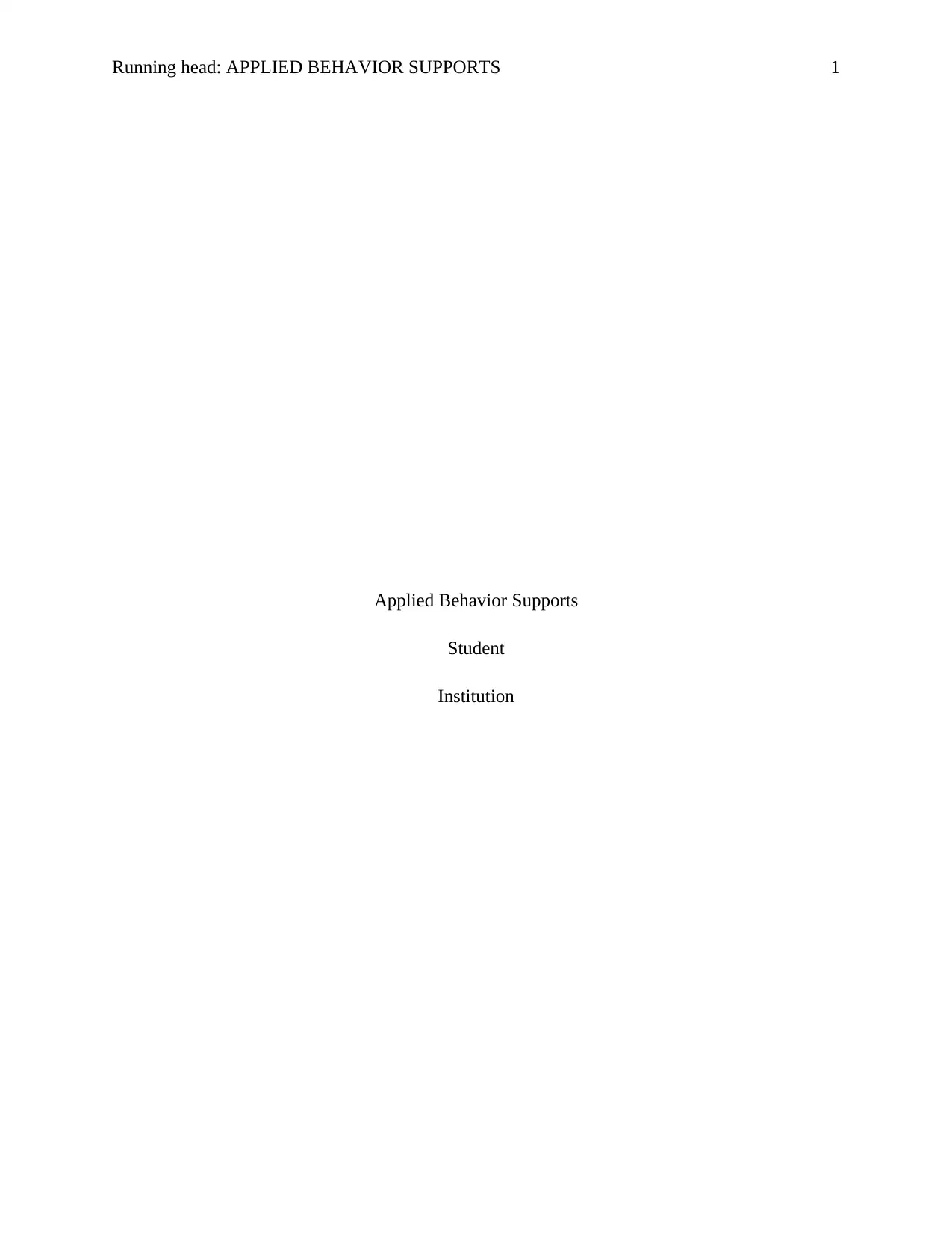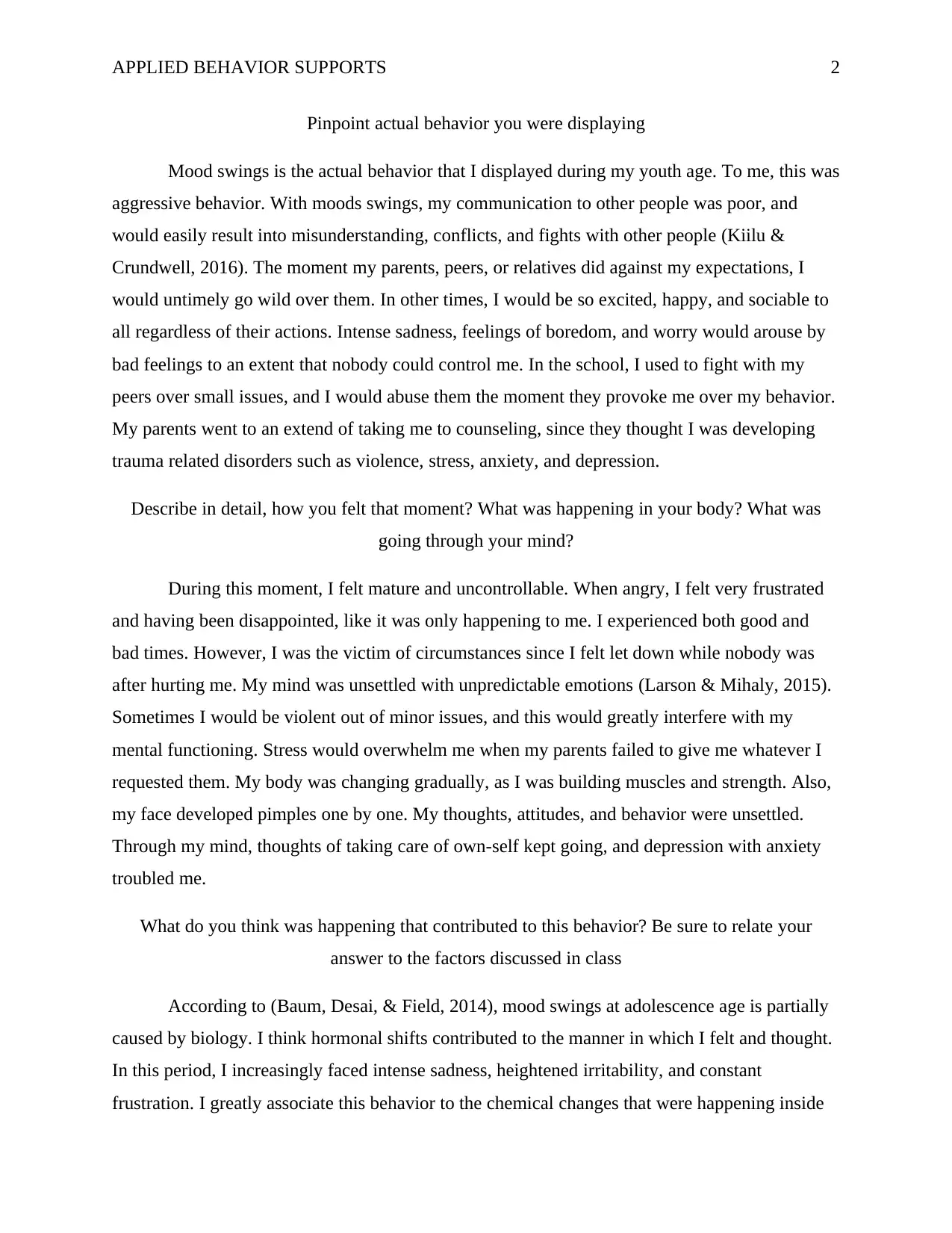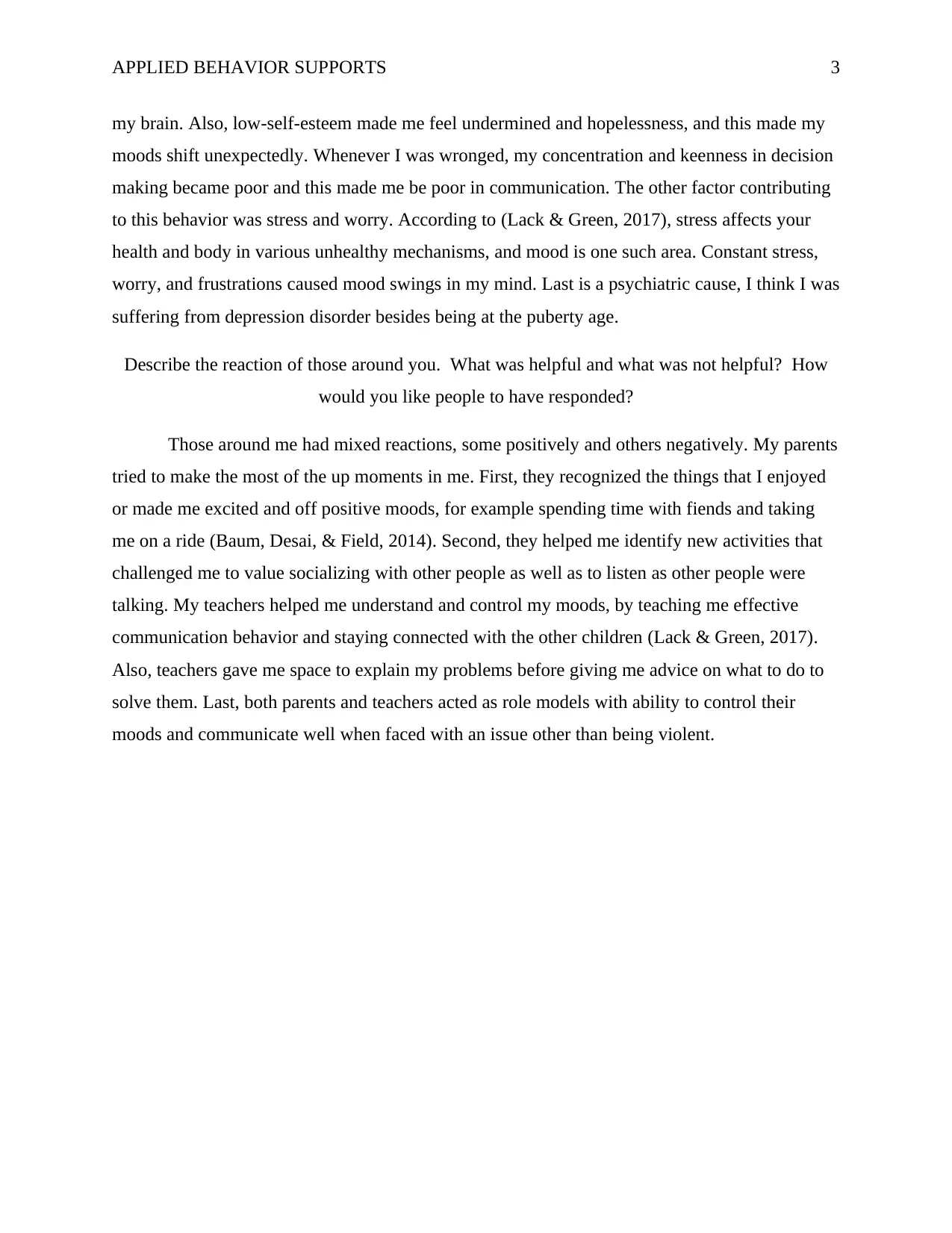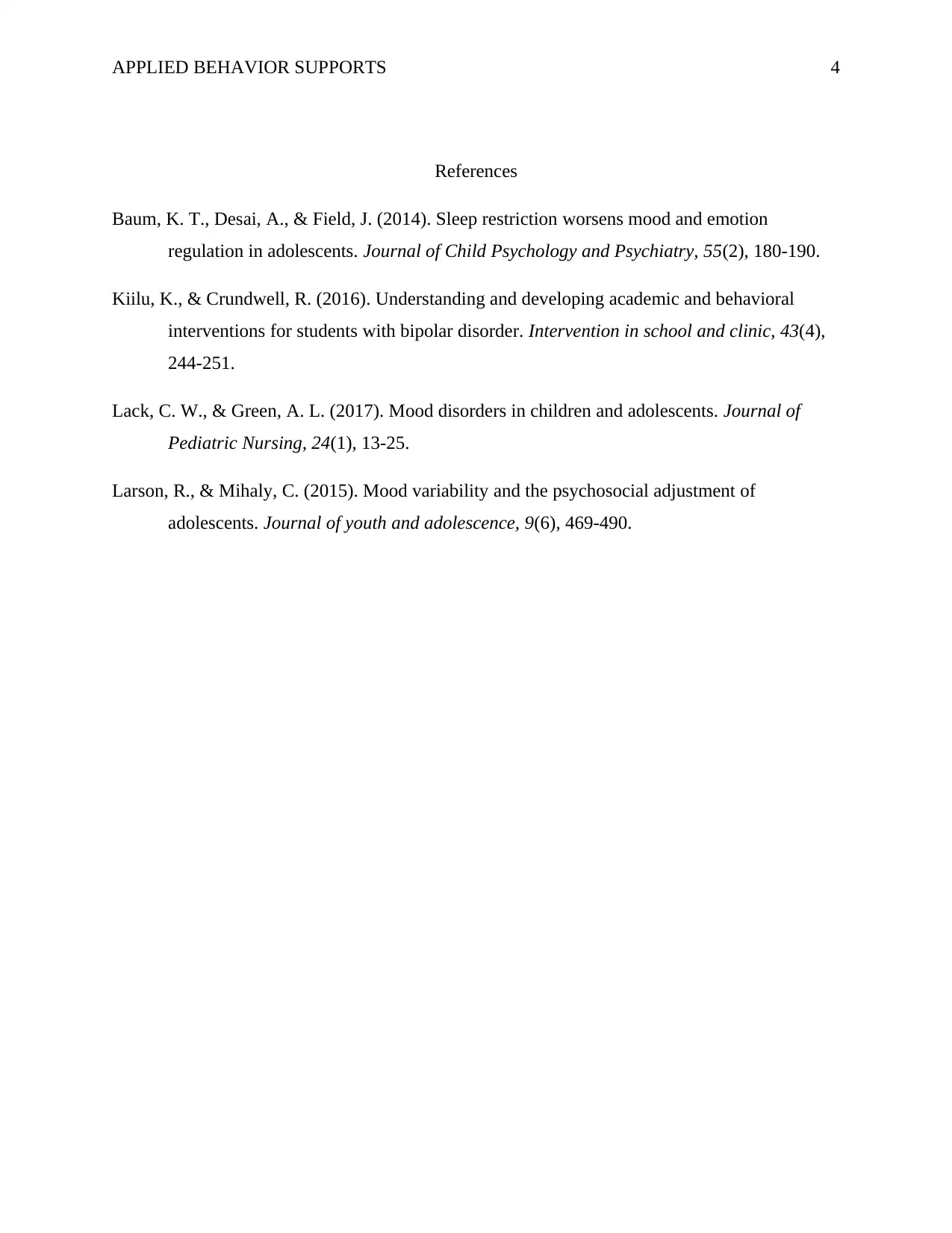Loyalist College - DSWP 1007: Reflection on Applied Behavior Supports
VerifiedAdded on 2022/10/02
|4
|956
|237
Homework Assignment
AI Summary
This assignment is a reflection on a student's personal experience with challenging behavior, specifically mood swings during adolescence. The student pinpoints the behavior, describes their feelings, physical sensations, and thoughts during those moments. They analyze potential contributing factors, including biological influences (hormonal shifts), low self-esteem, stress, and possible psychiatric causes like depression. The student also details the reactions of those around them, differentiating between helpful and unhelpful responses, and expressing how they would have preferred people to react. The reflection incorporates course concepts from Applied Behavior Supports, demonstrating an understanding of how these principles relate to real-life experiences. The student uses references to support their analysis.

Running head: APPLIED BEHAVIOR SUPPORTS 1
Applied Behavior Supports
Student
Institution
Applied Behavior Supports
Student
Institution
Paraphrase This Document
Need a fresh take? Get an instant paraphrase of this document with our AI Paraphraser

APPLIED BEHAVIOR SUPPORTS 2
Pinpoint actual behavior you were displaying
Mood swings is the actual behavior that I displayed during my youth age. To me, this was
aggressive behavior. With moods swings, my communication to other people was poor, and
would easily result into misunderstanding, conflicts, and fights with other people (Kiilu &
Crundwell, 2016). The moment my parents, peers, or relatives did against my expectations, I
would untimely go wild over them. In other times, I would be so excited, happy, and sociable to
all regardless of their actions. Intense sadness, feelings of boredom, and worry would arouse by
bad feelings to an extent that nobody could control me. In the school, I used to fight with my
peers over small issues, and I would abuse them the moment they provoke me over my behavior.
My parents went to an extend of taking me to counseling, since they thought I was developing
trauma related disorders such as violence, stress, anxiety, and depression.
Describe in detail, how you felt that moment? What was happening in your body? What was
going through your mind?
During this moment, I felt mature and uncontrollable. When angry, I felt very frustrated
and having been disappointed, like it was only happening to me. I experienced both good and
bad times. However, I was the victim of circumstances since I felt let down while nobody was
after hurting me. My mind was unsettled with unpredictable emotions (Larson & Mihaly, 2015).
Sometimes I would be violent out of minor issues, and this would greatly interfere with my
mental functioning. Stress would overwhelm me when my parents failed to give me whatever I
requested them. My body was changing gradually, as I was building muscles and strength. Also,
my face developed pimples one by one. My thoughts, attitudes, and behavior were unsettled.
Through my mind, thoughts of taking care of own-self kept going, and depression with anxiety
troubled me.
What do you think was happening that contributed to this behavior? Be sure to relate your
answer to the factors discussed in class
According to (Baum, Desai, & Field, 2014), mood swings at adolescence age is partially
caused by biology. I think hormonal shifts contributed to the manner in which I felt and thought.
In this period, I increasingly faced intense sadness, heightened irritability, and constant
frustration. I greatly associate this behavior to the chemical changes that were happening inside
Pinpoint actual behavior you were displaying
Mood swings is the actual behavior that I displayed during my youth age. To me, this was
aggressive behavior. With moods swings, my communication to other people was poor, and
would easily result into misunderstanding, conflicts, and fights with other people (Kiilu &
Crundwell, 2016). The moment my parents, peers, or relatives did against my expectations, I
would untimely go wild over them. In other times, I would be so excited, happy, and sociable to
all regardless of their actions. Intense sadness, feelings of boredom, and worry would arouse by
bad feelings to an extent that nobody could control me. In the school, I used to fight with my
peers over small issues, and I would abuse them the moment they provoke me over my behavior.
My parents went to an extend of taking me to counseling, since they thought I was developing
trauma related disorders such as violence, stress, anxiety, and depression.
Describe in detail, how you felt that moment? What was happening in your body? What was
going through your mind?
During this moment, I felt mature and uncontrollable. When angry, I felt very frustrated
and having been disappointed, like it was only happening to me. I experienced both good and
bad times. However, I was the victim of circumstances since I felt let down while nobody was
after hurting me. My mind was unsettled with unpredictable emotions (Larson & Mihaly, 2015).
Sometimes I would be violent out of minor issues, and this would greatly interfere with my
mental functioning. Stress would overwhelm me when my parents failed to give me whatever I
requested them. My body was changing gradually, as I was building muscles and strength. Also,
my face developed pimples one by one. My thoughts, attitudes, and behavior were unsettled.
Through my mind, thoughts of taking care of own-self kept going, and depression with anxiety
troubled me.
What do you think was happening that contributed to this behavior? Be sure to relate your
answer to the factors discussed in class
According to (Baum, Desai, & Field, 2014), mood swings at adolescence age is partially
caused by biology. I think hormonal shifts contributed to the manner in which I felt and thought.
In this period, I increasingly faced intense sadness, heightened irritability, and constant
frustration. I greatly associate this behavior to the chemical changes that were happening inside

APPLIED BEHAVIOR SUPPORTS 3
my brain. Also, low-self-esteem made me feel undermined and hopelessness, and this made my
moods shift unexpectedly. Whenever I was wronged, my concentration and keenness in decision
making became poor and this made me be poor in communication. The other factor contributing
to this behavior was stress and worry. According to (Lack & Green, 2017), stress affects your
health and body in various unhealthy mechanisms, and mood is one such area. Constant stress,
worry, and frustrations caused mood swings in my mind. Last is a psychiatric cause, I think I was
suffering from depression disorder besides being at the puberty age.
Describe the reaction of those around you. What was helpful and what was not helpful? How
would you like people to have responded?
Those around me had mixed reactions, some positively and others negatively. My parents
tried to make the most of the up moments in me. First, they recognized the things that I enjoyed
or made me excited and off positive moods, for example spending time with fiends and taking
me on a ride (Baum, Desai, & Field, 2014). Second, they helped me identify new activities that
challenged me to value socializing with other people as well as to listen as other people were
talking. My teachers helped me understand and control my moods, by teaching me effective
communication behavior and staying connected with the other children (Lack & Green, 2017).
Also, teachers gave me space to explain my problems before giving me advice on what to do to
solve them. Last, both parents and teachers acted as role models with ability to control their
moods and communicate well when faced with an issue other than being violent.
my brain. Also, low-self-esteem made me feel undermined and hopelessness, and this made my
moods shift unexpectedly. Whenever I was wronged, my concentration and keenness in decision
making became poor and this made me be poor in communication. The other factor contributing
to this behavior was stress and worry. According to (Lack & Green, 2017), stress affects your
health and body in various unhealthy mechanisms, and mood is one such area. Constant stress,
worry, and frustrations caused mood swings in my mind. Last is a psychiatric cause, I think I was
suffering from depression disorder besides being at the puberty age.
Describe the reaction of those around you. What was helpful and what was not helpful? How
would you like people to have responded?
Those around me had mixed reactions, some positively and others negatively. My parents
tried to make the most of the up moments in me. First, they recognized the things that I enjoyed
or made me excited and off positive moods, for example spending time with fiends and taking
me on a ride (Baum, Desai, & Field, 2014). Second, they helped me identify new activities that
challenged me to value socializing with other people as well as to listen as other people were
talking. My teachers helped me understand and control my moods, by teaching me effective
communication behavior and staying connected with the other children (Lack & Green, 2017).
Also, teachers gave me space to explain my problems before giving me advice on what to do to
solve them. Last, both parents and teachers acted as role models with ability to control their
moods and communicate well when faced with an issue other than being violent.
⊘ This is a preview!⊘
Do you want full access?
Subscribe today to unlock all pages.

Trusted by 1+ million students worldwide

APPLIED BEHAVIOR SUPPORTS 4
References
Baum, K. T., Desai, A., & Field, J. (2014). Sleep restriction worsens mood and emotion
regulation in adolescents. Journal of Child Psychology and Psychiatry, 55(2), 180-190.
Kiilu, K., & Crundwell, R. (2016). Understanding and developing academic and behavioral
interventions for students with bipolar disorder. Intervention in school and clinic, 43(4),
244-251.
Lack, C. W., & Green, A. L. (2017). Mood disorders in children and adolescents. Journal of
Pediatric Nursing, 24(1), 13-25.
Larson, R., & Mihaly, C. (2015). Mood variability and the psychosocial adjustment of
adolescents. Journal of youth and adolescence, 9(6), 469-490.
References
Baum, K. T., Desai, A., & Field, J. (2014). Sleep restriction worsens mood and emotion
regulation in adolescents. Journal of Child Psychology and Psychiatry, 55(2), 180-190.
Kiilu, K., & Crundwell, R. (2016). Understanding and developing academic and behavioral
interventions for students with bipolar disorder. Intervention in school and clinic, 43(4),
244-251.
Lack, C. W., & Green, A. L. (2017). Mood disorders in children and adolescents. Journal of
Pediatric Nursing, 24(1), 13-25.
Larson, R., & Mihaly, C. (2015). Mood variability and the psychosocial adjustment of
adolescents. Journal of youth and adolescence, 9(6), 469-490.
1 out of 4
Related Documents
Your All-in-One AI-Powered Toolkit for Academic Success.
+13062052269
info@desklib.com
Available 24*7 on WhatsApp / Email
![[object Object]](/_next/static/media/star-bottom.7253800d.svg)
Unlock your academic potential
Copyright © 2020–2026 A2Z Services. All Rights Reserved. Developed and managed by ZUCOL.




